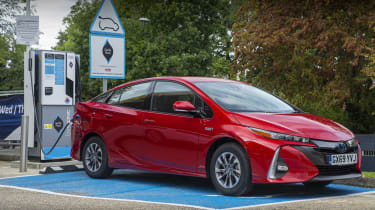Toyota Prius Plug-In (2016-2022) range, MPG, CO2 & charging
The Toyota Prius Plug-in offers a competitive electric range and easy charging. The petrol engine reduces range anxiety for longer journeys, too
| Fuel economy | CO2 emissions | Electric range | Wallbox charge time |
|---|---|---|---|
| 188-217mpg | 28g/km | 34 miles | 2hrs 30mins (0-100%, 3.7kW) |
While the Toyota Prius Plug-In's claimed economy of 188-217mpg should be taken with a pinch of salt, if you recharge religiously, close to 100mpg is easily possible, keeping running costs incredibly low.
Toyota Prius Plug-In range
Of course, the official fuel-economy test result of 188-217mpg is incredibly impressive, but in reality it’ll be difficult to match that figure unless you spend 99% of your time driving around town and can recharge your car frequently.
However, with most driver’s average daily mileage rarely exceeding a maximum of 40 miles, with the Prius’ all-electric range of 34 miles it means that if you can plug in at home and your destination, filling up at a fuel station might not be a regular occurrence.
A plug-in hybrid gives you the flexibility to travel long distances if you need to, and over an extensive road test our sister title Auto Express found that the Prius Plug-In returned excellent real-world fuel economy of 67mpg. Based on these figures, with that 34-mile zero-emissions range built in, you’ll be able to travel 638 miles, which is a big cruising range given the fuel tank is only 43 litres.
Charge time
The Prius Plug-In comes with two different types of charging cable: a regular three-pin plug to give added flexibility and a Type 2 cable that’s compatible with home wallboxes and public charging points. With an 8.8kWh battery, the car takes around four hours to charge from a domestic socket, while a wallbox cuts this to approximately two-and-a-half hours thanks to the Prius’ 3.3kW charging capability.
The Toyota has a built-in charging timer, too, so if you’re topping up at home overnight then you can set the system to draw its charge when your home switches over to a lower cost off-peak electricity tariff.
There was also a solar roof option, which uses cells mounted on the car’s roof to draw energy from the sun. It’s not much, but this energy can be diverted to power the climate-control and infotainment, taking the load off the engine and/or battery to improve economy.




